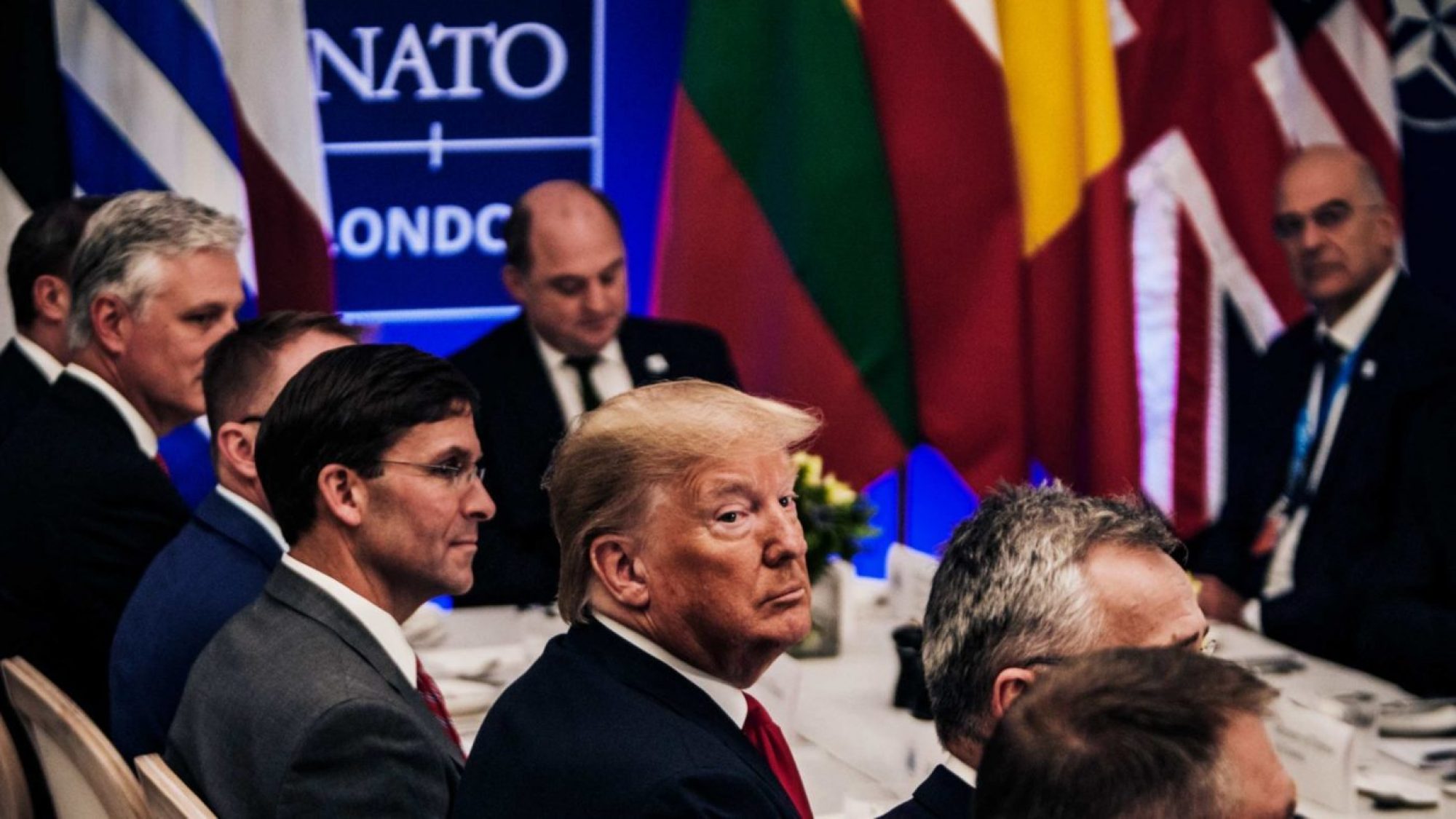
Title: The US-NATO Relationship: The Cost of Maintaining Political Pressure on Allies
Policymakers have to balance the United States’ relationship with its North Atlantic Treaty Organization (NATO) allies. If the United States gets too comfortable with allied relations, allies will feel more secure relying on US security guarantees. The tenser the relationship between them, the more NATO allies will pay in defense as US guarantees are brought into question and could, in turn, invite Russian adventurism. While the Trump administration’s pressure on NATO allies has increased their defense spending, policymakers must weigh that short-term gain with the long-term effects of a waning US commitment to NATO.
On July 29, 2020, Secretary of Defense Mark Esper announced the withdrawal of 11,900 US military personnel from Germany. This plan proposed to send roughly half of those troops back to the United States, while the rest would be redistributed around Europe. Secretary Esper explained that the troop movements were part of a broader military reorganization, but President Trump countered that claim by linking the reason for the withdrawal of troops to Germany’s “delinquent” payments to NATO. He noted that Germany had yet to meet the 2014 Wales Pledge to spend two percent of its GDP on defense. The Trump administration has used this troop withdrawal to pressure US allies to contribute more to the alliance or face the prospect of declining US commitments to Europe. While the Trump administration’s pressure will increase defense spending among European allies who fear a complete US withdrawal, it will also degrade the deterrence offered by the United States’ security obligations to the alliance.
The Trump administration has threatened NATO allies to the point that they fear the United States may withdraw from the organization or not fulfill its obligations to Article V unless the allies meet the objective of spending two percent of their GDP on defense. Past administrations have called for NATO allies to contribute more to the alliance for decades. However, they have never called into question the US commitment to Europe. Yet, this pressure has forced the European allies to start taking greater ownership of their security at the cost of warm relations with the United States as seen through allied leader’s statements.
In order to pressure allies, the United States has to send costly signals, such as withdrawing troops from Europe, to demonstrate that their security interests have diverged. This political pressure acts as a forceful method to motivate NATO allies to do more because it provides a credible threat of exclusion from the benefits of US protection. Within NATO, only the United States maintains and controls the conventional and nuclear capacity to deter and defend against existential threats to the alliance. No other ally has the expeditionary military capacity to do so. For example, Estonia is not worried about being abandoned by Romania, Portugal, or even Germany, knowing none of them could bring a sizable military force to bear in response to a Russian invasion or fait accompli. In this case, Estonia’s chief concern revolves around the United States’ guarantee of their sovereignty through NATO. Suppose the United States can make credible claims that it is willing to abandon an ally and not fulfill its treaty obligations. In that case, the ally will experience a drastic incentive to increase its military capabilities to defend itself.
It may seem that these tensions and fears will only lead to negative outcomes, but some disunity within an alliance can yield positive results. Several articles researching the implications of free-riding and burdening-sharing in alliances have supported this notion. In Olson and Zeckhauser’s seminal article on burden-sharing, they wrote, “This fact leads to the paradoxical conclusion that a decline in the amity, unity, and community of interest among allies need not necessarily reduce the effectiveness of an alliance…” and “The United States, at least, should perhaps not hope for too much unity in common ventures with other nations. It might prove extremely expensive.” Similarly, Plumper and Neumayer note in reference to the smaller allies (non-US allies), “Unless the interests of alliance members are independent, the existence of NATO allows the smaller allies to free-ride to some extent.”
Moreover, the breakdown of unity in the alliance caused by the Trump administration demands has compelled European allies to take a larger role in their defense. The former German Ambassador to the United States, Peter Wittig, described the Trump administration’s approach as a “healthy wakeup call for the Europeans…to not free-ride.” Currently, the leaders of NATO member-states feel they cannot rely on the United States as the sole guarantor of Europe’s security. Back in 2017, German Chancellor Angela Merkel stated, “We Europeans truly have to take our fate into our own hands” and, “We can’t rely on the superpower of the United States.” A year later, French President Emmanuel Macron reinforced this sentiment declaring, “It is up to us today to take our responsibilities and guarantee our own security, and thus have European sovereignty.” More recently, in response to the planned troop withdrawal announced this past summer, the German Defense Minister Annegret Kramp-Karrenbauer called the move “regrettable” and noted, “The truth is that a good life in Germany and Europe depends more and more on how we ensure our security ourselves.”
These responses from European leaders show that startling allies into thinking the United States will abandon them has influenced allies to increase defense spending in line with the 2014 Wales Pledge. However, in the long term, NATO policymaking should employ a balanced approach. If the United States brings its security guarantee of the alliance too much into question, Russia or other states may take action to test the United States’ resolve. During the Cold War, US leaders continually reaffirmed their commitment to allies, effectively deterring a Soviet invasion. Deterrence works best when allies clearly express their mutual obligations to all actors on the international stage.
The experience of the United Kingdom and Germany leading up to World War I provides an example of how the United Kingdom’s lack of a solid commitment to its allies allowed German leaders to think the British would stand aside in the war. Barbara Tuchman details this situation in her book The Guns of August. The failure of King George V and the UK Foreign Secretary to give a definite guarantee of joining the war should Germany invade allowed the Kaiser to think that he could attack without a British intervention. If the British had made a direct declaration of support for its allies, German leadership might have decided against escalating the war. This case gives policymakers an idea of what could happen if the United States does not maintain a firm commitment to its NATO allies. US leaders must watch how far they allow the US commitment to NATO wane in competitors’ eyes or risk possible adventurism on the eastern flank of NATO.
What do these two conflicting options mean for US policymakers? If the United States wants allies to meet the defense spending requirements, it needs them to fear the possibility that the United States may abandon them because their interests no longer align. The allies will only fear abandonment if the United States sends costly signals to them, such as troop withdrawals. As of 2020, the majority of allies that meet the elusive two percent spending goal sit on NATO’s eastern flank, fearing Russia and desiring US protection. Nevertheless, spending across the alliance has increased since 2014, in part, due to the Trump administration’s application of political pressure calling into doubt US interests in Europe. However, in the medium- and long-term, threatening to abandon allies will decrease the appearance of US security guarantees and invite competitors to push boundaries.
Policymakers must balance the coercion needed to increase contributions of European allies by making them question US intentions, but not distance the United States to the point that it jeopardizes the alliance or the deterrence that the US military power provides. A snapshot of one such policy could involve pulling a significant number of permanently stationed US forces from Europe, while reassuring US commitments to its allies through rotational deployments (not of equal number to the withdrawal) in support of NATO’s Enhanced Forward Presence and other operations. This concept aims to incentivize allies to build up military strength for initial deterrence and defense on the continent with the backing of US security guarantees, but lacking the tangible comfort drawn from a large permanent US force presence. With the probability that the incoming Biden administration will quickly mend relations in Europe, it runs the risk of reversing the current trend of increasing defense spending across the alliance and fostering free-riding. The United States should not go running back into the arms of the Europeans. Rather, it should maintain blunt political pressure on the Europeans to do more while ensuring its commitment to its allies remains clear to NATO’s potential adversaries.
. . .
Tad A. Schnaufer II is a Ph.D. Candidate in the School of Politics, Security, and International Affairs (SPSIA) at the University of Central Florida (tad.schnaufer@knights.ucf.edu). He also serves as an Infantry Officer in the Florida Army National Guard. The views expressed in this article are those of the author and do not necessarily reflect the official policy or position of the Department of the Army, Department of Defense, or the U.S. Government.
Recommended Articles

Critical maritime infrastructures (CMI), and in particular undersea communication cables, are increasingly under threat of attacks by malign actors who benefit from asymmetric capabilities and jurisdictional complexities in the maritime…

This article explores how the Palestinian crisis and the death of the two-state solution endangers the Hashemite Kingdom of Jordan. It illuminates the complicated relationship between Jordan, Israel, and Palestine…

This article explores the uncertain future of Arctic governance amid shifting global geopolitics. It argues that whether Washington and Moscow opt for confrontation or cooperation, multilateralism in the Arctic…